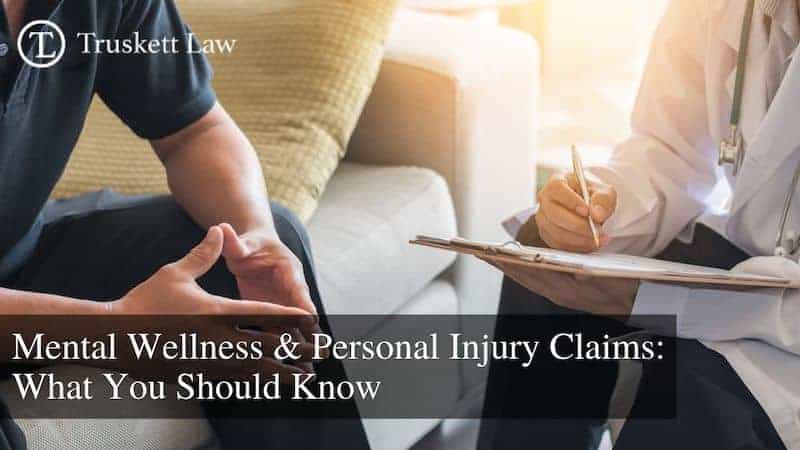
09 Nov Mental Health Injury Personal Injury Cases: What You Should Know
If you’ve ever been involved in an accident that resulted in a personal injury, you have the right to seek compensation. Personal injuries can follow a car accident or a slip-and-fall incident. Injuries such as dislocations, sprains, strains, fractured or broken bones, and any other physical injuries are easy to attribute to a specific incident. But a question arises when you consider damages that result from personal injuries. Are they only physical, or can a personal injury be mental?
Are Mental Health Personal Injuries Legitimate?
So, can a personal injury be mental or psychological? In short, absolutely. Psychological injuries take on many different forms and can be just as crippling as a physical injury. Long after physical wounds have healed, victims of serious accidents sometimes continue to suffer from psychological damage or mental illness injury. It is possible to receive fair compensation for treating these issues, just like you do for any other medical expenses resulting from a personal injury.
Victims of psychological or mental injuries can often be reluctant to seek help for their distress. They may feel like they should be able to get over it quickly or “shake it off.” People assume that trauma must be caused by something as significant as the death of a loved one or a natural disaster.
However, trauma is anything that is deeply disturbing or distressing, and that can look different for each individual. For example, you don’t have to be the driver in an accident for it to be traumatic. You can witness it as a passenger or bystander and have it affect you.
Types of Psychological Personal Injuries
Psychological injuries come in a wide variety. A person injured in a personal injury may suffer from psychological injuries or emotional distress damages. Three categories of mental injuries include traumatic brain injuries, emotional trauma, or the inability to cope after an accident.
- Traumatic Brain Injury (TBI): a collision or hit to the head can cause a traumatic brain injury or concussion. These are physical issues, but they can also result in cognitive or mental impairment.
- A TBI can result in memory loss, trouble concentrating, and problem-solving and reasoning issues.
- Emotional Trauma: a traumatic experience can cause mental disorders. The memories of fear, pain, or witnessing harm can be devastating.
- Emotional trauma can be seen in the form of insomnia, fatigue, loss of appetite, and emotions such as anger, fear, or sadness.
- Inability to Cope: accidents have the power to change a person’s life forever, including how they deal with trauma. From visible injuries such as scars, lost limbs, or limps to permanent disabilities, it can be difficult for someone to face their new reality. They may not be able to enjoy activities that they previously were able to participate in. This inability to function normally can cause mental disorders and psychological distress.
- People who struggle to cope can experience mood swings, insomnia, and weight loss as well as the same signs as those with emotional trauma.
How to Identify Mental Illness Personal Injuries
Just like physical injuries, psychological problems after an accident should be evaluated and treated with the help of a mental health professional. When examined, there may include a diagnosis of several different mental health issues. Symptoms for various issues may overlap as you can experience more than one condition at a time.
Other general mental issues caused may include:
- Clinical Depression: feelings of sadness and grief are common after an accident, but sometimes it can develop into clinical depression when these feelings consume a person. Due to their depression, they may lose interest in activities they once enjoyed or become moody or lethargic. This can disrupt their daily lives and their interactions with those around them.
- Anxiety: feelings of stress can make someone feel overly tense or jumpy. A person may overthink and worry about things constantly. This constant stress can result in sleep issues and the inability to relax. Increased blood pressure or gastrointestinal problems may also develop.
- Mental Anguish or Fear: trauma can sometimes also trigger an irrational fear of something specific. For example, if you are involved in a car accident, you may be afraid to get into a car, let alone drive. A victim of a dog bite may become petrified of dogs. A drawing victim may be terrified of water. Phobias can often interfere with a person’s ability to go about their daily routine.
- Post-Traumatic Stress Disorder: PTSD is common in people who’ve been through a traumatic event. Often, certain situations, sights, or sounds can trigger them into reliving the shock and stress of the incident. People who have PTSD may also suffer from nightmares, depression, or hyper-awareness. These can lead to insomnia, mood swings, and the use of alcohol or drugs in an effort to cope and self-medicate.
- Chronic Pain Disorder: a victim can suffer from acute pain caused by psychological stress. Sometimes injuries are hard to tie directly to an incident. Feelings of pain are real, but there isn’t a direct link to physical damage, and they might be non-specific. Two examples are conditions like sciatica and tinnitus. Those who experience chronic pain disorder may also experience symptoms of other mental illnesses like anxiety, depression, or insomnia.
Just like it can be difficult to overcome physical injuries, it can be just as challenging to heal mental ones. The time it takes to heal also depends on the individual. Every person is different, so not everyone will experience the same level of pain and suffering. Some people can even experience delayed injuries that can take days, weeks, or even months for some mental issues to show up. Mental injuries can also outlast physical injuries.
Compensation For Mental Health Personal Injuries
 Often, psychological or emotional damages can be a component of “pain and suffering” when seeking compensation. Reimbursement for hospitalization, medication, counseling, or psychological treatment should all be included in the settlement.
Often, psychological or emotional damages can be a component of “pain and suffering” when seeking compensation. Reimbursement for hospitalization, medication, counseling, or psychological treatment should all be included in the settlement.
The person who was negligent and caused another person to experience personal injury is liable for damages. Psychological issues can become chronic and can result in permanent disability or prolonged recovery. A list of things you can receive compensation for include:
- Lost wages and future income
- Ongoing therapy and medication
- Caregivers for daily life assistance
- Emotional distress
- Pain and Suffering
Proving Mental Personal Injuries
The first thing you have to do, as with any personal injury case, is to prove liability. It’s essential to document any injury you receive from a personal injury, including psychological or emotional distress. You’ll want to keep a record of any medical treatment you receive.
If or when you receive medical documentation about any physical injury, be sure to tell your doctor about the mental symptoms you’ve experienced since the accident. Having medically-documented emotional distress can be a vital component of your case.
You should also keep a daily journal or diary to record how you feel after the accident and in regards to your injuries. Document the small and large ways your everyday life was changed. The more evidence for emotional and psychological distress you can gather, the stronger your claim will be.
You must seek the proper treatment as soon as possible after an accident. A mental health professional is able to make a specific diagnosis using the American Psychiatric Association Diagnostic and Statistical Manual of Mental Disorders. Not all conditions are measurable as there is no test to pinpoint mental illness, but regardless, you should seek medical treatment. As with physical injuries, mental injuries can be proven with documentation.
Severity of Mental Distress
It’s safe to assume that everyone goes through some degree of mental and emotional distress after an injury. However, the severity of your emotional or mental distress will vary from person to person. It has a direct impact on your potential for compensation. You’ll need to document your pain through a medical provider, if possible. Generally, you want to prove that your emotional or mental stress is ongoing and affects your daily life. Most importantly, you’ll want to have proof that it is directly related to the physical injuries you’ve suffered.
In some instances, the harm inflicted was purposeful. For these cases, you may want to include a separate claim for intentional infliction of emotional distress if the defendant clearly intended to cause emotional distress as well as physical harm.
Contacting a Personal Injury Lawyer
Again, you must seek legal advice from an experienced professional personal injury lawyer. They’ll walk you through every step from beginning to end and help explain the process to you. Truskett Law attorneys work exclusively as personal injury lawyers and are proud to serve the Tulsa area. We care about you and your case and will ensure that you are correctly legally advised. We’re honest with you, whether good or bad. We work for you, our highest priority. Contact us today to schedule a free case evaluation.
Don’t risk it. Call Truskett.
Medical Disclaimer
This article is not intended to diagnose or give you medical advice in place of any medical professional. Always seek advice from your physician or other qualified health providers. Never delay seeking medical help or disregard it.
If at any time you think you are having a medical emergency, call 911 immediately. If you are thinking about hurting yourself, feeling suicidal, or are concerned that someone you know may be in danger of hurting themself, call the National Suicide Prevention Lifeline: 1-800-273-8255.


Sorry, the comment form is closed at this time.